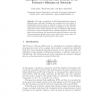Free Online Productivity Tools
i2Speak
i2Symbol
i2OCR
iTex2Img
iWeb2Print
iWeb2Shot
i2Type
iPdf2Split
iPdf2Merge
i2Bopomofo
i2Arabic
i2Style
i2Image
i2PDF
iLatex2Rtf
Sci2ools
ECAL
2005
Springer
2005
Springer
Emergence of Structure and Stability in the Prisoner's Dilemma on Networks
We study a population of individuals playing the prisoner’s dilemma game. Individual strategies are invariable but the network of relationships between players is allowed to change over time following simple rules based on the players’ degree of satisfaction. In the long run, cooperators tend to cluster together in order to maintain a high average payoff and to protect themselves from exploiting defectors. We investigated both synchronous and asynchronous network dynamics, observing that asynchronous update leads to more stable states, and is more tolerant to various kinds of perturbations in the system.
| Added | 27 Jun 2010 |
| Updated | 27 Jun 2010 |
| Type | Conference |
| Year | 2005 |
| Where | ECAL |
| Authors | Leslie Luthi, Mario Giacobini, Marco Tomassini |
Comments (0)

